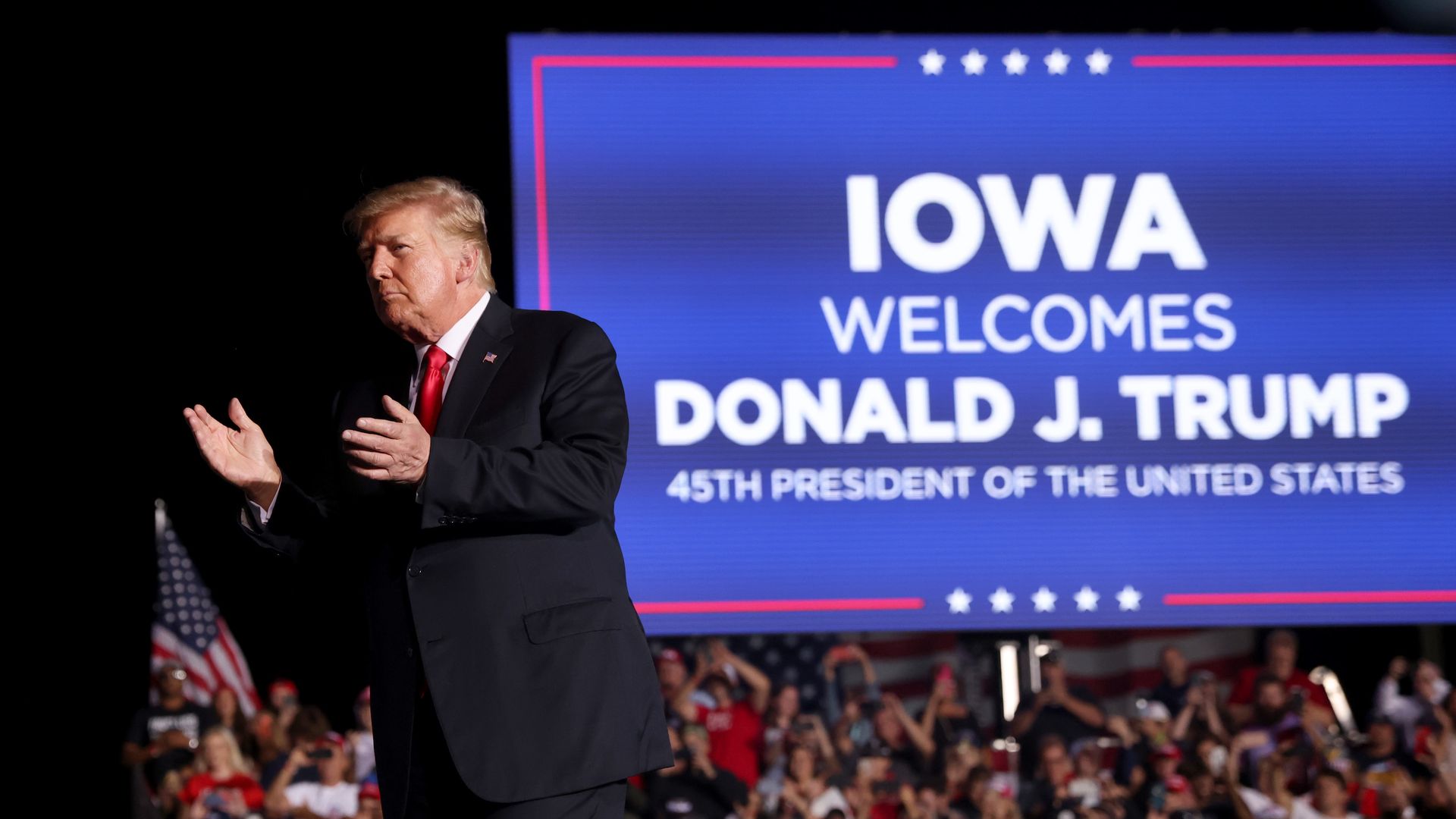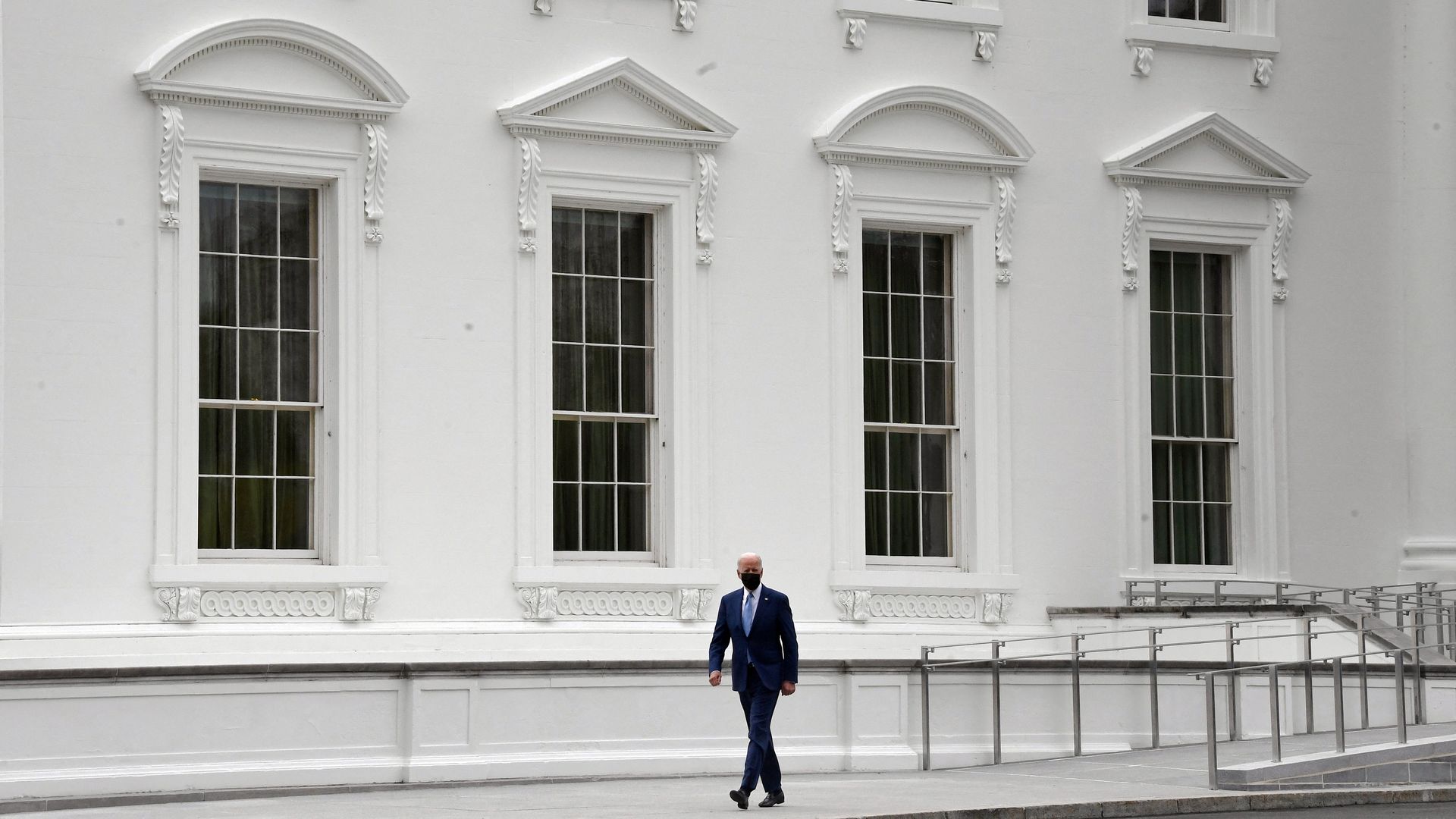| | | | | | | Presented By Facebook | | | | Axios Sneak Peek | | By the Axios Politics team ·Oct 10, 2021 | | Welcome back to Sneak. ⚡Situational awareness: Facebook's Nick Clegg warned today that dumping algorithms could fuel more hate speech — not less. Smart Brevity™ count: 1,946 words ... 7.5 minutes. Edited by Glen Johnson. | | | | | | 1 big thing: Scoop - Ben and Jerry on Texas and Georgia |  | | | Ben Cohen (left) and Jerry Greenfield with Alexi McCammond. Photo: "Axios on HBO" | | | | The activist co-founders of Ben & Jerry's admitted in an interview with Alexi McCammond for "Axios on HBO" that they don't know how to hold states like Georgia and Texas accountable when they pass laws with which they disagree. Why it matters: Ben Cohen and Jerry Greenfield have made progressive politics synonymous with their brand. The 70-year-old entrepreneurs, who no longer control the company but retained their right to be its social conscience, have shown they'll use business muscle in pursuit of their ideals. Lexi asked, during an interview in the brand's home state of Vermont: "You guys are big proponents of voting rights. Why do you still sell ice cream in Georgia? Texas — abortion bans. Why are you still selling there?" - "I don't know," Ben Cohen said with a laugh. "It's an interesting question. I don't know what that would accomplish. We're working on those issues, of voting rights. ... I think you ask a really good question. And I think I'd have to sit down and think about it for a bit."
- When pressed on the Texas limits on women's access to abortion, Cohen said: "By that reasoning, we should not sell any ice cream anywhere. I've got issues with what's being done in almost every state and country. "
- "One thing that's different is that what Israel is doing is considered illegal by international law. And so I think that's a consideration," Greenfield said.
One of the company's latest moves — its 2021 decision to stop selling ice cream in Israeli-occupied Palestinian territories — led to serious backlash. - Cohen and Greenfield wrote a joint NYT op-ed defending the company's decision. "While we no longer have any operational control of the company we founded in 1978, we're proud of its action and believe it is on the right side of history," they wrote.
- Thirty-five states in the U.S. have anti-Israel boycott laws, and so far four have announced they're taking action or considering divesting from Unilever, Ben & Jerry's parent company.
- Greenfield told "Axios on HBO" that those states' decisions are based on "misinformation" that "Ben & Jerry's and Unilever are being characterized as boycotting Israel — which is not the case at all. It's not boycotting Israel in any way," he said.
The bottom line: Cohen said they have found "ways to do things that increase justice — and also increase ice-cream sales." - "Ben & Jerry's publicly supported Occupy Wall Street, Black Lives Matter. But over the years, the company continues to sell more ice cream and thrive," Greenfield said.
📺 Watch: Ben and Jerry speak. |     | | | | | | 2. Left warns of "double threat" |  | | | Illustration: Sarah Grillo/Axios | | | | A progressive group warns Democrats they're facing a "double threat" heading into the midterms: voters of color aren't supporting Democratic candidates at the same rates, and the Republican Party is inspiring first-time voters of color to turn out and support it instead. Why it matters: Democrats may control the White House and both chambers of Congress now, but history shows their party is set to lose seats next cycle. These latest findings question their strength with Black, Latino and AAPI voters — typically considered reliable Democratic blocs, Lexi also writes. - Way to Win, a leading progressive fundraising and organizing group, led the study in partnership with 32 state-based organizations and a host of other polling and data firms.
- The report is one of the most exhaustive studies of the 2020 election.
- It analyzed 64.8 million voters who participated last year across 11 battleground states: Virginia, Georgia, North Carolina, Florida, Colorado, Arizona, Nevada, Texas, Minnesota, Michigan and Pennsylvania.
The big takeaway: Democrats made gains with some white voters in 2020 — mostly non-evangelical Christians — but saw once-reliable members of their base shift to Republicans. - The GOP increased its support in these places specifically thanks to new voters of color.
- In particular, Republicans got a boost from Latino voters in Texas, Asian American Pacific Islander (AAPI) voters in Georgia and Black voters — especially men — in Nevada, North Carolina, Georgia, Florida and Colorado.
- Among the 2020 first-time voters who supported a Republican candidate, roughly 20% were people of color. While 55% of the Democrats' new voters in 2020 were people of color, 20% is a high percentage for the GOP.
What they're saying: "These trends ... demonstrate the urgent need for campaigns and independent groups to stop assuming voters of color will vote Democrat," Way to Win writes in its report. - The group criticizes the Democratic Party for directing "the majority of resources — and genuine persuasion efforts — at white voters."
- "Democrats must contend with a double threat in these 11 key battleground states — erosion of Democratic support, and new voter enthusiasm for the GOP among voters of color and younger voters."
But, but, but: Democrats cracked 50% support among Latinos in all 11 states overall, and over half of the first-time 2020 voters in these areas supported them. - Way to Win points to the Sun Belt as an area where the Democratic Party can seek more support in 2022.
- "The majority of new, likely Democratic voters live in the South and Southwest, places the Democratic establishment have long ignored or are just waking up to now," the group wrote.
The group's suggestion for how to win in 2022? "Progressives must find messages that unify the whole coalition around a shared vision." The bottom line: Democrats' "winning" coalition, the report says, is multigenerational, multiracial and has near equal representation of white voters and voters of color. - Unifying that coalition — especially for a party with self-proclaimed messaging issues — is a tall order.
|     | | | | | | 3. Mapped: State muscle |  Data: Quorum State; Cartogram: Kavya Beheraj/Axios There are twice as many states that have solid, Republican-control legislatures as those with solid, Democratic-controlled ones, according to Quorum's new 2021 State Legislative Trends Report. Why it matters: The power of state legislatures has been on national display in recent weeks, with Texas and other states passing voting and abortion restrictions and coronavirus-related laws, as well as redrawing election district boundaries for the next decade, writes Axios' Stef Kight. - Sixteen states have solid Republican control, compared to eight states with solid Democratic control.
- Fourteen states have slight Republican control. Eleven states, plus Washington, D.C., have slight Democratic control.
- Nebraska has the only unicameral legislature, and does not have any formal party alignments — although most members tend to affiliate with state political parties.
Between the lines: The data reveals how much more control Republicans have over state laws in the U.S., but it also shows which states could most easily be flipped. - Minnesota, Arizona, New Hampshire, Michigan and Virginia have the slimmest partisan advantages in their state legislatures. Minnesota has only a 3% Democratic advantage, and Virginia 16%.
- Of the 10 slimmest-state legislature majorities, only three lean Democrat.
- The rest lean Republican, potentially handing Democrats a shot at taking back legislature control in more states in upcoming elections.
|     | | | | | | A message from Facebook | | Internet regulations are as outdated as dial-up | | |  | | | | Facebook supports updated regulations, including four areas where lawmakers can make quick progress: - Reforming Section 230.
- Preventing foreign interference of our elections.
- Passing federal privacy law.
- Setting rules that allow people to safely transfer data between services.
| | | | | | 4. First look: Dems' NFT dreams |  | | | Illustration: Annelise Capossela/Axios | | | | A group of Democratic operatives plans to turn political memorabilia and photos into NFTs, looking to raise money by minting — and then selling — digital assets beyond the sports and entertainment arenas, Axios' Hans Nichols reports. Why it matters: With both conservative and liberal groups already spending millions to pressure lawmakers over President Biden's social safety net expansion, Democrats are looking to tap into non-fungible tokens to outraise their opponents. Driving the news: On Monday, a new group, Front Row, will launch a political NFT marketplace — and only allow Democratic campaigns and causes to use it. - The first NFTs for sale will be digital collectibles from the Texas Democratic Party.
- For example, for $250, a political activist can purchase a digital "Wanted" poster, with animation, of different Texas lawmakers who fled the state this year in a failed effort to block the state's new restrictive voting law.
Flashback: In August, Scott Jensen, a Republican candidate for governor in Minnesota, released two NFTs to raise money for his 2022 campaign. - He claimed to be the first politician to offer an NFT.
- Sports and entertainment stars were early adopters of the trend, with Tom Brady and Tiger Woods the latest to cash in.
How it works: A political organization or campaign will create an NFT, establish the number of tokens and then set the price. - Buyers will purchase the NFT through the Front Row website, much like a traditional donor would donate to a campaign through the Act Blue website.
- The donor — or more accurately, the purchaser — would then own the NFT.
- The proceeds will go to the campaign, with Front Row taking a transaction fee.
- The sales will have to conform to campaign finance laws. Federal candidates will be limited to selling NFTs for $5,800 — the maximum per-cycle contribution — while PACs and party committees can up their prices accordingly.
The big picture: The first-ever NFT, artist Kevin McCoy's "Quantum," was auctioned off for $1.47 million in January. - The NFT market has since exploded, with trading volume rising to $10.67 billion, according to CNBC.
Go deeper: While NFTs mostly use blockchain technology, they don't need to be purchased with cryptocurrency. - The National Republican Congressional Committee has tried to tap into the crypto craze by announcing it would start accepting contributions in cryptocurrency, Axios reported in June.
|     | | | | | | 5. Flipping for Trump |  | | | Former President Trump during his rally in Des Moines, Iowa, last night. Photo: Scott Olson/Getty Images | | | | Some high-dollar donors to former North Carolina Gov. Pat McCrory put their money behind Rep. Ted Budd, his U.S. Senate primary opponent, after Donald Trump endorsed Budd this year, according to records reviewed by Axios' Lachlan Markay. Why it matters: The former president's endorsement can be literal currency in Republican primary fights. The shifting allegiances between McCrory and Budd illustrate how Trump can single-handedly alter not just support but the money race in high-profile political fights. What's happening: David Congdon, the executive chairman of trucking giant Old Dominion Freight Line, gave the legal maximum to McCrory's primary campaign in April, according to Federal Election Commission records. The big picture: In general, a Trump endorsement has the ability to affect voters' and donors' thinking in several ways. - He remains immensely popular among Republicans, who may be inclined to vote for his preferred candidates out of loyalty or a belief he has the party's best interests at heart.
- For that reason, a Trump endorsement also makes a GOP primary candidate more viable — and donors in particular tend to gravitate toward candidates with better odds of winning.
- The ex-president's notorious aversion to perceived disloyalty also may sway would-be candidates, donors and campaign workers concerned about drawing his or his political team's ire.
Between the lines: Trump's political sway is most apparent within the grassroots, and the North Carolina Senate primary has seen some smaller voters switch allegiances after Trump's endorsement. - One retiree from Cashiers, North Carolina, chipped in $250 to McCrory in April. Four days after Trump backed Budd, she gave him twice as much.
- Another retiree from Sanibel, Florida, gave $300 to McCrory in May. A month later, after Trump's endorsement, he gave the same sum to Budd.
- Both people donated to Trump's 2016 and 2020 campaigns.
Looking ahead: Most of Trump's GOP primary endorsements this year have come during the past few months, and any additional effect on donor loyalties will be more apparent in campaigns' third-quarter fundraising numbers. - Those reports are due to the FEC by Oct. 15.
|     | | | | | | 6. Pic du jour |  | | | Photo: Olivier Douliery/AFP via Getty Images | | | | President Biden walks along the North Face of the White House on Friday before signing three proclamations restoring protections for national monuments. |     | | | | | | A message from Facebook | | Facebook's industry-leading investments are stopping bad actors | | |  | | | | We've invested $13 billion in teams and technology over the last 5 years to enhance safety. It's working: In just the past few months, we took down 1.7 billion fake accounts to stop bad actors from doing harm. But there's more to do. Learn more about how we're working to help you connect safely. | | | | 📬 Thanks for reading. We are taking a break the rest of the week. Our political news will post in Axios AM, Axios PM and on Axios.com and the Axios app. See you next Sunday. A reminder that your family, friends and colleagues can subscribe to Sneak or any of Axios' other free newsletters through this link. |  | | It'll help you deliver employee communications more effectively. | | | | | | Axios thanks our partners for supporting our newsletters. If you're interested in advertising, learn more here.
Sponsorship has no influence on editorial content. Axios, 3100 Clarendon Blvd, Suite 1300, Arlington VA 22201 | | | You received this email because you signed up for newsletters from Axios.
Change your preferences or unsubscribe here. | | | Was this email forwarded to you?
Sign up now to get Axios in your inbox. | | | | Follow Axios on social media:    | | | | | |











No comments:
Post a Comment